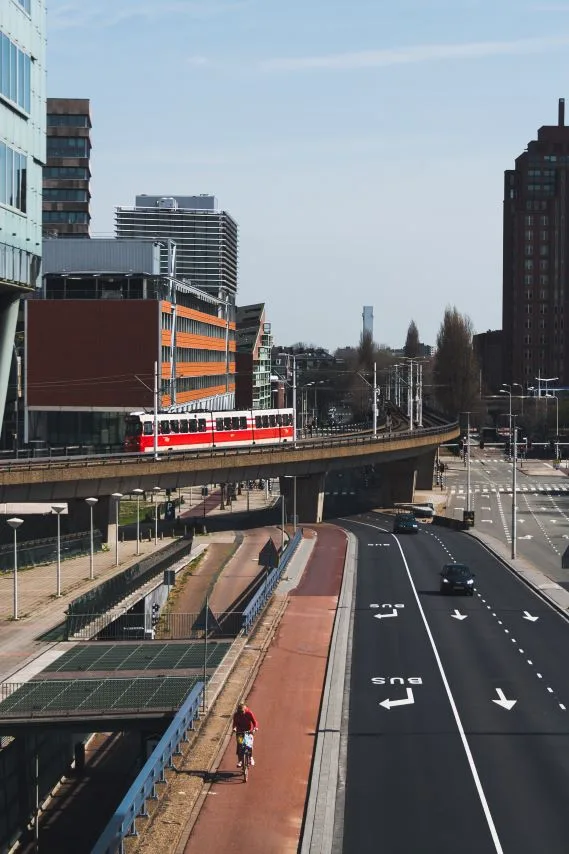Ever wondered just how efficient it is to use cycling as a primary method of transport? In this article we’ll delve a bit deeper into the efficiency of biking vs. driving a car and walking.
There are obviously use cases where cycling is impractical or not the right choice for day-to-day transport. Both distance and speed required must be borne in mind if you’re evaluating how practical it is to utilize cycling over other transport options. The efficiency benefits of cycling are usually most profound in cities with less distance between waypoints. However, if the distance is manageable and within your capabilities, cycling is of course not a city-only exercise and there are many great routes and use cases in rural settings.
Beyond distance and speed, other major efficiency factors would be cost, environmental impact, and health benefits. Let’s evaluate these in a bit more detail below.

Environmental Impact
Full stop, cycling is the most environmentally efficient mode of transportation. Unlike cars, which obviously emit greenhouse gases and contribute to air pollution, bicycles produce zero emissions (UNLESS cyclists are feeling particularly flatulent 🙂 ). Walking is of course also great for the environment, but it’s nowhere near as efficient for longer distances as cycling.

Cost Savings
Generally, the cost of bicycles is much lower than the cost of comparable transport methods. I say “generally” because there are an increasing number of premium bike options by manufacturers and these can be priced MUCH higher than you think, some costing more than cars! Those are edge cases however, for prices in the hundreds one can generally obtain a great bike from a solid manufacturer. The ongoing costs of cycling are minimal and can be reduced even further if you’re handy and like to work on your own bike (We’ll have more tips on that in coming articles). Again, walking is virtually free and a competitive option in terms of efficiency, but only when the distances are relatively short. Good public transport is not a universal reality in many cities, but even where it is, the cost of a daily commute can add up quickly.

Time Efficiency
In terms of faster A to B travel, driving an automobile is usually perceived as the fastest. Reality often doesn’t match this perception though, as congested roads can add hours onto travel times. The greater agility of bikes allows cyclists to usually avoid such traffic, especially in cities. In large cities it can be not only slower to drive a car vs. bike, it can be significantly more expensive (increasingly cities are adding daily charges for city drivers). Further, many big cities with great public transport like New York, Chicago, and London are having increasing issues with delays owing to postpandemic financial issues.

Health Benefits
Any form of cardio exercise that also serves as a transport method is a win-win. As such, both cycling and walking do offer significant health benefits, but only cycling adds health benefits plus a much increased distance advantage. The benefits on heart health, weight, and mental health from regular cardio exercise are undoubtable. Its also worth stating that for people with certain health issues (ie knee problems), cycling might be an even lower impact exercise with all the additional benefits mentioned above. Cycling is generally also more intense than walking, with an increased heart rate and resulting increase of calories burned. Obviously, using a car provides none of these benefits. Public transport is also relatively sedentary and puts you more at risk of communicable diseases.

Space Efficiency
Bicycles of course take up less room than cars and require smaller parking spaces. You can even bring your bike into your apartment and there are increasing storage options in many cities. Many employers are increasingly offering storage options in the office for those days when you need to head in. Obviously walking wins the space efficiency argument overall!

Social Benefits
The cycling community is pretty awesome. I’ve noticed that regardless of your level of seriousness, most cyclists are helpful and friendly. If you’re stopped next to a cyclist on the road, its not unusual for a small conversation to start. There are many clubs specifically focused on cycling that can allow you to expand your social circle. It might be an unusual case but I know one guy who met his future wife near his office (he spoke with her after nearly hitting her with his bike, wouldn’t try this deliberately!) and two couples who met through a cycling club.
It’s fairly safe to conclude that cycling is an environmentally friendly, cost effective, and healthy option for shorter to moderate distances, especially in urban areas. Your own circumstances and priorities will inform the transport option that is best for you, but why not give cycling a chance if you can? It’s hard to overlook all the benefits!


